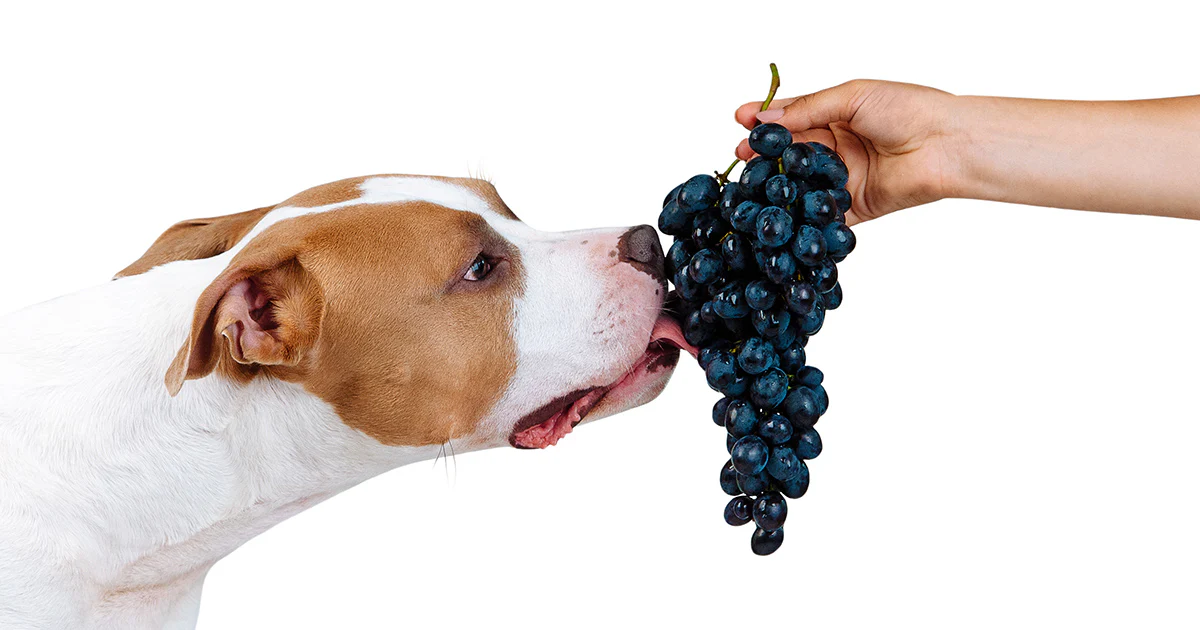When it comes to dog safety, not all human foods are created equal. Grapes are one such food that poses a serious risk to our canine companions. While many pet owners may be unaware, grapes and raisins can be toxic to dogs, leading to severe health issues. This article will explore the dangers of grapes for dogs, the symptoms of grape poisoning, and what to do if your dog has consumed grapes.
Why Are Grapes Toxic to Dogs?
The exact reason why grapes and raisins are toxic to dogs is still unknown, but it is widely accepted that they can cause acute kidney failure in dogs, even in small amounts. Some dogs may be more sensitive to grapes than others, meaning that while some can ingest small quantities without apparent harm, others can experience severe effects after eating even a few grapes.
Key Facts about Grape Toxicity:
- All Dogs Are Affected Differently: Not every dog that eats grapes will show signs of poisoning, but it’s impossible to predict which dogs are at risk. Even small amounts can be dangerous.
- No Safe Amount: There is no known safe quantity of grapes or raisins for dogs. All forms—fresh grapes, raisins, and even grape juice—should be strictly avoided.
Symptoms of Grape Poisoning in Dogs
If a dog consumes grapes, symptoms of poisoning may appear within 6 to 24 hours. The severity of symptoms can vary depending on the amount ingested and the individual dog’s sensitivity. Common signs of grape toxicity include:
- Vomiting and Diarrhea: One of the first signs of grape poisoning may be vomiting, often accompanied by diarrhea. This can occur within a few hours of ingestion.
- Lethargy: Affected dogs may appear unusually tired or sluggish, showing a lack of interest in activities they normally enjoy.
- Loss of Appetite: Dogs may refuse to eat or drink water, which can quickly lead to dehydration.
- Abdominal Pain: Dogs may exhibit signs of discomfort, such as whining, pacing, or a tense abdomen.
- Increased Thirst and Urination: As kidney function begins to decline, dogs may drink more water than usual and urinate more frequently.
- Dehydration: Due to vomiting, diarrhea, and reduced water intake, dogs can become dehydrated quickly.
- Kidney Failure: In severe cases, dogs may develop symptoms of kidney failure, including weakness, lethargy, bad breath (with a chemical odor), and decreased or absent urine production.
What to Do If Your Dog Eats Grapes
If you suspect that your dog has eaten grapes or raisins, it’s crucial to act quickly. Here are steps to take:
1. Contact Your Veterinarian Immediately
Call your vet or an emergency animal clinic right away. Time is of the essence when dealing with grape toxicity. Your veterinarian can guide you on what steps to take next based on your dog’s size and the amount of grapes ingested.
2. Inducing Vomiting
If the ingestion was recent (within the last hour or two), your vet may advise you to induce vomiting to prevent the grapes from being absorbed into your dog’s system. Do not attempt to induce vomiting without professional guidance, as it can be dangerous in some situations.
3. Follow Your Vet’s Recommendations
Your vet may recommend bringing your dog in for observation, blood tests, or treatment. In some cases, activated charcoal may be administered to help prevent the absorption of toxins.
4. Hospitalization and Treatment
If your dog shows signs of kidney damage or has ingested a significant amount of grapes, they may require hospitalization for intravenous fluids, medications, and supportive care to manage their symptoms and protect their kidneys.
Preventing Grape Poisoning
The best way to protect your dog from grape poisoning is to prevent access to grapes entirely. Here are some tips to help keep your dog safe:
- Avoid Feeding Grapes: Do not give grapes or raisins as treats, and do not include them in homemade dog food.
- Educate Family and Friends: Make sure everyone in your household and visitors know that grapes are toxic to dogs, so they do not accidentally feed them to your pet.
- Keep Grapes Out of Reach: Store grapes and raisins in cabinets or high shelves, and be vigilant about food spills or leftovers on the table.
- Be Cautious with Snacks: Some trail mixes and baked goods may contain raisins. Check labels and avoid giving your dog human snacks without confirming they are safe.
Takeaway Tips for Dog Owners
- No Grapes or Raisins: Grapes and raisins are toxic to dogs. Never feed them these fruits or any products containing them.
- Recognize Symptoms: Be aware of the symptoms of grape poisoning, such as vomiting, lethargy, and loss of appetite.
- Act Quickly: If your dog consumes grapes, contact your veterinarian immediately for guidance and potential treatment.
- Educate Others: Inform family and friends about the dangers of grapes to help keep your dog safe.
- Secure Food: Keep grapes and raisins stored safely away from your dog’s reach to prevent accidental ingestion.


